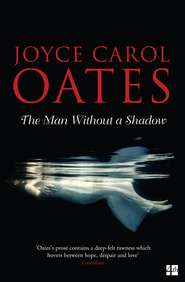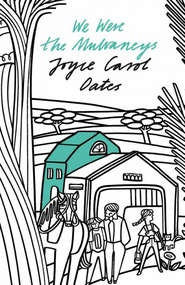По всем вопросам обращайтесь на: info@litportal.ru
(©) 2003-2025.
✖
Mudwoman
Автор
Год написания книги
2018
Настройки чтения
Размер шрифта
Высота строк
Поля
Unbidden the thought came to M.R.—My mother wanted me to die.
But how ugly this was, and in the student newspaper! No wonder Stirk had drawn what he claimed to be hate e-mail. No wonder there were undergraduates who resented him, mocked him. If Stirk were gay—as it appeared to be Stirk was—this “gayness” had nothing to do with his conservative beliefs, in fact would seem to be in opposition to conventional conservatism—which would have made of Alexander Stirk an unusual individual, perhaps, and a brave one. But in these issues which roused emotion like a dust storm, there was no time for nuance or subtleties; no time to consider paradoxes of personality.
Distressing to M.R. and her (liberal-minded) colleagues, that campus conservatives, in mimicry of conservatives through America since the triumphant Reagan years, were inclined to forgo subtleties. Their strategies of opposition were adversarial, confrontational—ugly. Their strategies were, as they put it, to go for the jugular.
When M.R. had first known Oliver Kroll, when she’d first come to teach moral philosophy at the University, Kroll had been less passionately involved in the conservative movement; M.R. had read Kroll’s essays on the history of American libertarianism, published in such prestigious journals as American Political Philosophy, and been impressed. For here was a perspective very different from her own, intelligently if not persuasively argued. M.R. had never felt comfortable with Kroll—for both political and personal reasons—but she’d admired his work and, to a degree, painful now to recall, they’d been friends—or more than friends, for a brief while; since that time, Kroll had become a (well-paid) consultant for the Republican administration in Washington and had become closely aligned with the University’s most famous—or notorious—conservative spokesman, G. Leddy Heidemann, an authority on “fundamentalist Islam” who was rumored to be intimately involved with (secret) preparations for the Iraqi invasion, a confidant of Defense Secretary Donald Rumsfeld. Both Kroll and Heidemann were much disliked at the University by a majority of their colleagues but they had a following among a number of students, primarily undergraduates.
M.R. found all this disturbing, and distasteful—like any administrator she feared for her authority even as she believed herself the very sort of administrator who cared little for “authority”—it was M. R. Neukirchen’s specialness that made her an effective president, an air of open-minded friendliness to all.
Yet it was upsetting to her that in growing quarters in the public media as on her very campus, the word liberal had become a sort of comic obscenity, not to be murmured without a smirk.
Like “pointy-headed intellectual”—the crude, coarse smear-phrase that had been used to discredit Adlai Stevenson in the ill-fated 1956 presidential election. How to defend oneself against such a—charge? Even to attempt to refute it was to be sullied by it, an object of ridicule.
“So, President Neukirchen—”
In his mock-reproachful pious-accusing voice Stirk continued his account of the assault and its aftermath. For twenty minutes he’d been speaking virtually nonstop as if declaiming his plight to a vast TV audience among which M.R. was a single listener. With remarkable brazenness—as if he understood how he was intimidating the president of the University—he paused to touch a forefinger to his lips.
“I wonder, President Neukirchen—have you ever listened to my radio broadcast—Headshots?”
“I’m afraid I have not.”
“But I think—I hope—you’ve seen my column in the campus paper—‘Stirk Strikes’?”
“Yes. I’ve seen that.”
“The columns are posted online, too. So my ‘kingdom’ is not just of this campus.”
Stirk was speaking in his radio voice, M.R. supposed—a forced-baritone that belied the small-boned and seemingly muscleless body. How small. How easily he could be hurt.
Stirk’s bandaged head—the markedly narrow forehead that looked as if it had been pinched together in a vise, and the weak, melted-away chin … The eyes were Stirk’s most attractive feature despite being blackened and bruised and M.R. saw in them both insolence and yearning, desperation.
Love me! Love me and help me please God.
The plea that would never be voiced.
Without his pose of arrogance, as without his clothes, how defenseless Stirk would be! A sexless little figure, utterly vulnerable. M.R. imagined him as a young adolescent, or as a child—intimidated by bigger boys, made to feel inferior, contemptible. In the world in which she’d grown up, in upstate New York south of the Adirondacks, a boy like Alexander Stirk wouldn’t have had a chance.
It seemed touching to her, a gesture of sheer courage, or bravado—to have proclaimed himself so openly “gay.” Except Stirk’s “gayness” seemed also a kind of guise, or ruse; a provocation and a mask to hide behind.
Stirk was revealing now to M.R. that he had a list of names which he hadn’t yet given to the police—a list that Professor Kroll had helped him prepare—“Not just students but faculty, too. Some surprising names.” He intended to give this list to the University committee investigating the assault—but he wasn’t sure “just yet” about giving the list to the police.
What was wonderful about the assault—ironically!—was that he’d been receiving so much support from people “all over the country”—“an outpouring of sympathy and outrage.” Within the past day or so he’d had offers from “world-class” attorneys offering to represent him in lawsuits against his assailants and against the University for having failed to protect him…. The Washington Times, the Young America Foundation, the cable Fox News had contacted him requesting interviews….
M.R. winced to hear this. Of course—the conservative media would leap at the opportunity to interview one of their martyred own.
Sobering to consider how an incident on the University campus so very quickly made its way into a global consciousness—“cyberspace”—to be replicated—amplified—thousands of times! M.R. was beginning to feel faint. For this was shaping up to be the sort of campus controversy, swirling out of control like sewage rising in a flash flood, M.R. knew she must avoid; M.R. had assumed she could, with goodwill, common sense, hard work and sincerity avoid. Hadn’t she assumed that, if she met with the stricken boy personally, and alone—that would make a difference?
Leonard Lockhardt and other staffers had strongly suggested to M.R. that she not meet with Alexander Stirk alone—but M.R. had insisted: she wasn’t the sort of university president to distance herself from individual students, she was precisely the sort of administrator known to care for individuals. She’d expected that speaking with Stirk calmly, in private, she could reach out to him, and understand him; she could—oh, was this mere vanity?—naïveté?—impress him with her sincerity, and win his trust.
Make her his friend.
The call had come late the other night—very late—2 A.M.—when M.R. had only just gone to bed and lay sleepless amid the thrumming of her brain like a hive of bees—sleepless alone in the president’s bed in the president’s bedroom in the president’s house which was an “historic” building in the older, “historic” part of the University campus—she had only just left her home office, only just shut down her computer for the night and hoped to sleep a few hours at least before waking at 7 A.M. for a long day—all weekdays were long days—to be navigated with zest, with optimism, with hope—like a ski slope, a very long ski slope, the bottom of which wasn’t in sight from the top.
Nothing so beautiful and so thrilling as downhill skiing—if you have the skill.
The ringing phone, at 2 A.M.—precisely, 2:04 A.M.—and M.R. had answered it with apprehension, for of course it could be only bad news at such an hour—a call to the president’s unlisted, private line—a number which few individuals knew—the urgent voice of the University’s head of security informing her of this shocking news….
Oh God! Is he—how badly is he hurt?
Is it known who attacked him? Were they—students?
It would seem to M.R. that a bright, blinding light had suffused the room, and the nighttime landscape outside the window. Immediately she’d been wide awake—hyper-awake. She would be on, or near, the phone for hours.
Thinking What folly this is! I am not prepared for this.
Yet she would persevere. She would do what she could. Vastly relieved that the boy wasn’t critically—seriously—injured; impulsively deciding to drive to the hospital, to see him, at 6:20 A.M. in a wet wind-driven snow.
The hospital was a little more than a mile away from the president’s house. The last time M.R. had driven there, she’d visited an older colleague, a woman who’d had breast cancer surgery.
Before that, a male colleague, not older, who’d had prostate cancer surgery.
Both individuals had recovered, or so M.R. was given to believe.
She would tell no one at the University about this reckless pre-dawn act—no one on her staff, no confidante or friend. Certainly not the University counsel who urged caution in all matters that might involve publicity. And certainly not her (secret) lover for whom the entire adventure of M.R.’s University presidency was an improbable phantasmagoria, tinged with folly, vanity, naïveté.
Why this was, M.R. wasn’t so sure. Maybe because the presidency, beyond even M. R. Neukirchen’s brilliant academic career, was so very alien to him and so excluded him.
In a haze of excitement fueled by the insomniac stress of the past several hours M.R. drove to the hospital and parked at the brightly lighted emergency room at the rear and hurried inside breathless and apprehensive—a tall anxious-eyed woman asking if a young University student named Alexander Stirk was still there, and could she see him …
By this time, Stirk had been discharged. He’d left the hospital in the company of an individual M.R. had to assume was Oliver Kroll.
“Oh, I see! And is he—how is he?”
A young Indian doctor regarded M.R. with quizzical eyes. Who was this woman? What relationship to Stirk?
M.R. introduced herself. Seeing in the doctor’s startled gaze that yes, it was something of an incident in itself, something to be remarked upon, spoken of, that the president of the University had hurried to the ER before dawn to see the badly beaten undergraduate.
With a polite smile the doctor told M.R. that Alexander Stirk had been considered well enough to leave the ER and he would tell her what he wanted her to know of his medical condition—best to inquire of him.
M.R. went away rebuked. M.R. went away relieved.
For it had been a rash act, to drive to the hospital. She wondered if it had been a foolish act.
The University counsel Leonard Lockhardt would have disapproved. This canny individual whom President Neukirchen had inherited from her canny predecessor and whose general advice to the new University president was caution.
These are litigious times, keep in mind! And this University is known to be very wealthy.
But Leonard Lockhardt would never know that M.R. had driven to the hospital before dawn. No one would ever know, including Alexander Stirk.











